News from Maison de la Gare
A Possible Dream
Tweeter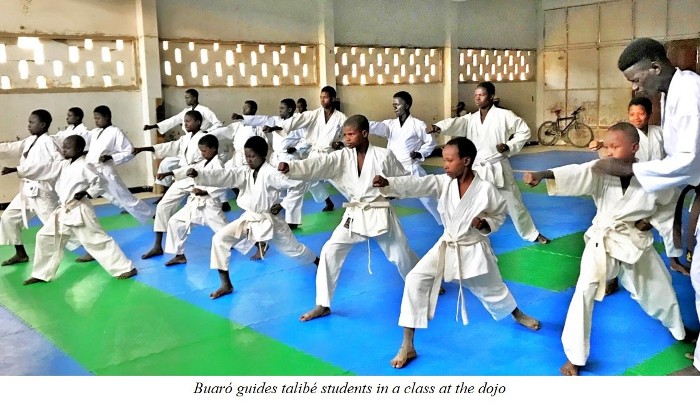
Buaró aspires to build his life on his love of karate
It is Thursday morning and he is one of the
first to arrive at the center. This early in the day, most of the talibé boys are still out
on the streets begging for their daily quotas of money or for a bite
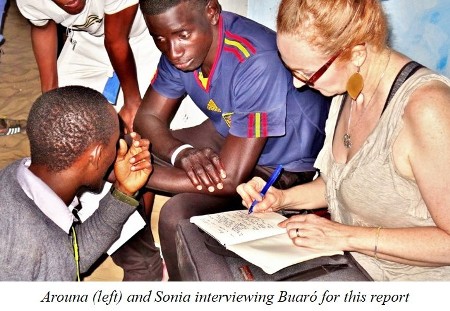 to eat for breakfast.
But soon, they will begin to trickle into Maison de la Gare. So Buaró works fast, sweeping
the sand of debris and pebbles that could hurt bare feet or trip up a martial artist focused
on his kata.
to eat for breakfast.
But soon, they will begin to trickle into Maison de la Gare. So Buaró works fast, sweeping
the sand of debris and pebbles that could hurt bare feet or trip up a martial artist focused
on his kata.
As the sun rises higher in the West African sky, children begin to tumble through the gates
in ones, twos and threes. They greet Noël who tracks their attendance at the centre and
helps Buaró to administer the karate program, and some of the boys entrust him with the
money they have collected so far this day for their marabouts. Meanwhile, Buaró sorts
through the karate uniforms, the gi, to determine if they need laundering or if they will last
for another lesson. Talibés stop to greet Buaró before skipping out onto the newly cleared
sand to wrestle and play. Some stay to watch him, waiting for
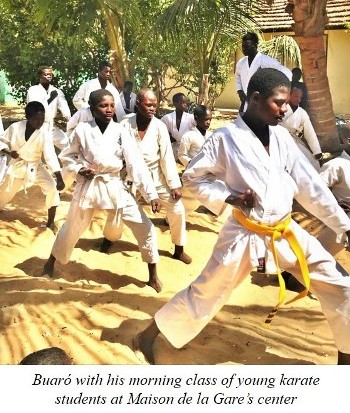 the signal that it is time to
put on one of the white karate gi's and line up for class.
the signal that it is time to
put on one of the white karate gi's and line up for class.
Buaró was sent to Senegal at the age of seven from his home in Guinea Bissau to be a talibé,
when his mother died. His eight brothers and six sisters remained at home with his father.
Buaró did not see his family or home again until three years ago. Now he is 22 years old
and he misses his family very much. Although he cannot read it, he keeps his birth
certificate with him, evidence of his full proper name and proof of a family far away.
He prefers to be known simply by his family name, “Buaró”.
Buaró still lives in his daara. He says he will remain there as long as he must, until he
is ready to move on. Despite having forgotten most of the Portuguese of his childhood and
hardly knowing his family anymore, Buaró longs to return home someday, this time for good.
He devotes his life to karate as much as he can. He discovered
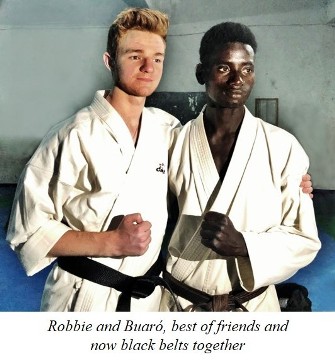 karate in Saint Louis even
before it was offered to the talibés at Maison de la Gare. He worked extra hard for years,
raising enough money to not only pay the required “versement” to his marabout, but to cover
his monthly dojo membership fees so he could practice karate at night.
karate in Saint Louis even
before it was offered to the talibés at Maison de la Gare. He worked extra hard for years,
raising enough money to not only pay the required “versement” to his marabout, but to cover
his monthly dojo membership fees so he could practice karate at night.
Not long after karate began at Maison de la Gare, Buaró met the young Canadian who had
founded the program there, Robbie Hughes, and they became close friends. He became a
recipient of the Maison de la Gare program sponsoring monthly dojo fees for more advanced
talibés, and devoted himself even more to karate. Buaró's sensei soon sent him, as an
advanced belt, to Maison de la Gare to assist with the morning classes there. As a talibé
himself, Buaró could relate well to the boys, and they trusted him. Under Buaró's
leadership, Maison de la Gare’s karate program has continued to grow, regularly attracting
new talibé students excited to unlock the mysteries of martial arts.
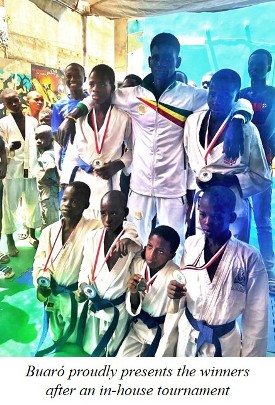
Recently Buaró earned his black belt, an extraordinary achievement that was celebrated
by everyone at Maison de la Gare, as well as by his sensei and dojo and all the
international supporters of Maison de la Gare’s karate program.
Buaró experiences a challenging language barrier with many people, as he does not speak
French. However, when teaching and practicing karate, the universal language of karate
breaks down the communication barriers. He hopes to have time to begin learning French
soon in the classes at Maison de la Gare.
Buaró is grateful to Maison de la Gare for giving him the opportunity to devote more of
his time to karate training, and for sponsoring his participation in local, regional and
even national karate tournaments. This moves him ever closer to his objective.
For Buaró, karate is life. He has a dream, to progress and learn enough from his sensei
and his experience 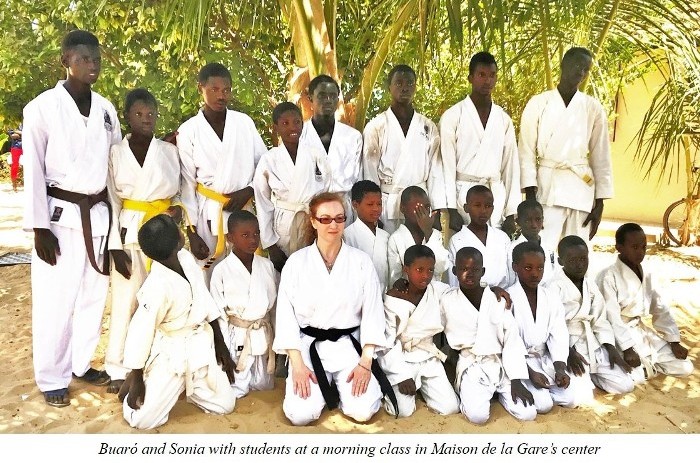 with martial arts to prepare him to return home to Guinea Bissau to
start his own dojo. Buaró knows this road will be long. There is much to learn before
he will be ready. But it is a dream worth working towards, to be able to make karate,
the love of his life, part of his life forever.
with martial arts to prepare him to return home to Guinea Bissau to
start his own dojo. Buaró knows this road will be long. There is much to learn before
he will be ready. But it is a dream worth working towards, to be able to make karate,
the love of his life, part of his life forever.

